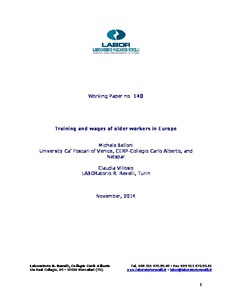Training and wages of older workers in Europe
"The financial deficits of many social security systems caused by ageing populations and stagnating economies are forcing workers to retire later from the labour market. An extended working life combined with rapid technological progress in many sectors, is likely making older workers’ skills o...
| Main Authors: | , |
|---|---|
| Institution: | ETUI-European Trade Union Institute |
| Format: | TEXT |
| Language: | English |
| Published: |
Turin
2014
LABOR |
| Subjects: | |
| Online Access: | https://www.labourline.org/KENTIKA-19116919124919341919-Training-and-wages-of-older-wo.htm |
| Summary: | "The financial deficits of many social security systems caused by ageing populations and stagnating economies are forcing workers to retire later from the labour market. An extended working life combined with rapid technological progress in many sectors, is likely making older workers’ skills obtained in school obsolete. In this context, lifelong investment in training is widely recognized among the international research and policy community as a key element to increase or at least limit the decline in productivity of older workers. This paper investigates the relationship between training undertaken by European older workers and their wages, relying on the Survey of Health, Ageing and Retirement in Europe. Undertaking training activities is associated with 6.3% higher wages. This premium is sizeable and is similar to that of attaining an upper or post-secondary degree instead of a primary or lower-secondary degree. Training wage premiums are highly heterogeneous across countries: they are highest in Austria, Germany, Greece, and Italy and are about half that in France and Spain. No premium is found for Denmark, Sweden, Belgium, the Netherlands, and Switzerland. Training premiums of the first group of countries can be overestimated due to training endogeneity and sample selection bias." |
|---|---|
| Physical Description: | 21 p. Digital |

